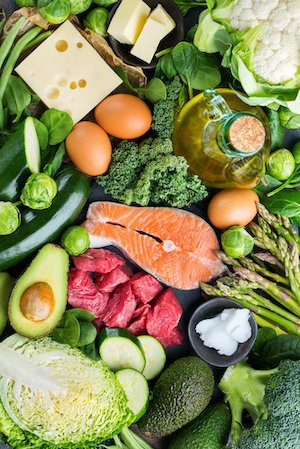When following a ketogenic diet, there are several key nutrients to consider to ensure you meet your nutritional needs. Here are some important nutrients to pay attention to:
-
Electrolytes: When you restrict carbohydrates, your body may excrete more water and electrolytes, which can lead to imbalances. Focus on getting adequate amounts of sodium, potassium, and magnesium. You can obtain these electrolytes from foods like avocados, nuts, seeds, leafy greens, and mineral-rich salt.
-
Fibre: Since a keto diet typically restricts high-carb foods like grains and legumes, it’s important to find alternative sources of dietary fibre. Include low-carb, fibre-rich foods such as non-starchy vegetables, nuts, seeds, and low-carb fruits like berries. Fibre supports digestive health, promotes satiety, and helps maintain stable blood sugar levels.
-
Omega-3 Fatty Acids: While a keto diet is high in fat, it’s crucial to prioritise healthy fats. Omega-3 fatty acids, found in fatty fish (e.g., salmon, mackerel) and flaxseeds, are important for heart health, brain function, and reducing inflammation. Consider incorporating these sources into your meals to maintain a balanced fat profile.
-
Vitamins and Minerals: Some nutrients, such as vitamins B, C, and E, as well as magnesium and selenium, may be lacking in a keto diet. It’s important to focus on obtaining essential vitamins and minerals from foods like leafy greens, cruciferous vegetables, organ meats, nuts, and seeds. However, it may be beneficial to consult with a healthcare professional or Nutritionist to address any potential deficiencies and determine if supplementation is necessary.
Remember, it’s essential to listen to your body and work with a healthcare professional or registered dietitian to ensure you meet your specific nutritional needs while following a ketogenic diet. They can provide personalised guidance and help you make any necessary adjustments to optimise your nutrient intake.

